Premium Only Content

President Putin takes part in the Valdai International Discussion Club meeting.
Valdai International Discussion Club meeting October 27th, 2022
The President took part in the final plenary session of the 19th meeting of the Valdai International Discussion Club.
The theme of this year's forum is A Post-Hegemonic World: Justice and Security for Everyone. The four day-long meeting brought together 111 experts, politicians, diplomats and economists from Russia and 40 foreign countries, including Afghanistan, Brazil, China, Egypt, France, Germany, India, Indonesia, Iran, Kazakhstan, South Africa, Turkiye, the United States, and Uzbekistan, to name a few.
* * *
Moderator of the Valdai Club’s plenary session Fyodor Lukyanov: Good afternoon, Mr President,
We look forward to seeing you every year, but this year, perhaps, we were more impatient than usual, since there are lots of issues to discuss.
President of Russia Vladimir Putin: I suppose so, yes.
Fyodor Lukyanov: The forum mainly focused on matters related to the international order, such as how the world is changing and, most importantly, who, in fact, is at the helm of the world, who runs it, and whether the world is amenable to being run at all.
However, we are discussing this as observers, but you have power, so please share your thoughts with us.
Vladimir Putin: Thank you very much.
Ladies and gentlemen, friends,
I had a chance to get a sense of what you discussed here during the last few days. It was an interesting and substantive discussion. I hope you do not regret coming to Russia and communicating with each other.
I am happy to see you all.
We have used the Valdai Club platform to discuss, more than once, the major and serious shifts that have already taken place and are taking place around the world, the risks posed by the degradation of global institutions, the erosion of collective security principles and the substitution of “rules” for international law. I was tempted to say “we are clear about who came up with these rules,” but, perhaps, that would not be an accurate statement. We have no idea whatsoever who made these rules up, what these rules are based on, or what is contained inside these rules.
It looks like we are witnessing an attempt to enforce just one rule whereby those in power – we were talking about power, and I am now talking about global power – could live without following any rules at all and could get away with anything. These are the rules that we hear them constantly, as people say, harping on, that is, talking about them incessantly
The Valdai discussions are important because a variety of assessments and forecasts can be heard here. Life always shows how accurate they were, since life is the sternest and the most objective teacher. So, life shows how accurate our previous years’ projections were.
Alas, events continue to follow a negative scenario, which we have discussed more than once during our previous meetings. Moreover, they have morphed into a major system-wide crisis that impacted, in addition to the military-political sphere, the economic and humanitarian spheres as well.
The so-called West which is, of course, a theoretical construct since it is not united and clearly is a highly complex conglomerate, but I will still say that the West has taken a number of steps in recent years and especially in recent months that are designed to escalate the situation. As a matter of fact, they always seek to aggravate matters, which is nothing new, either. This includes the stoking of war in Ukraine, the provocations around Taiwan, and the destabilisation of the global food and energy markets. To be sure, the latter was, of course, not done on purpose, there is no doubt about it. The destabilisation of the energy market resulted from a number of systemic missteps made by the Western authorities that I mentioned above. As we can see now, the situation was further aggravated by the destruction of the pan-European gas pipelines. This is something otherworldly altogether, but we are nevertheless witnessing these sad developments.
Global power is exactly what the so-called West has at stake in its game. But this game is certainly dangerous, bloody and, I would say, dirty. It denies the sovereignty of countries and peoples, their identity and uniqueness, and tramples upon other states’ interests. In any case, even if denial is the not the word used, they are doing it in real life. No one, except those who create these rules I have mentioned is entitled to retain their identity: everyone else must comply with these rules.
In this regard, let me remind you of Russia's proposals to our Western partners to build confidence and a collective security system. They were once again tossed in December 2021.
However, sitting things out can hardly work in the modern world. He who sows the wind will reap the whirlwind, as the saying goes. The crisis has indeed taken on a global dimension and has impacted everyone. There can be no illusions about this.
Humankind is at a fork in the road: either keep accumulating problems and eventually get crushed under their weight, or work together to find solutions – even imperfect ones, as long as they work – that can make our world a more stable and safer place.
You know, I have always believed in the power of common sense. Therefore, I am convinced that sooner or later both the new centres of the multipolar international order and the West will have to start a dialogue on an equal footing about a common future for us all, and the sooner the better, of course. In this regard, I will highlight some of the most important aspects for all of us.
Current developments have overshadowed environmental issues. Strange as it may seem, this is what I would like to speak about first today. Climate change no longer tops the agenda. But that fundamental challenge has not gone away, it is still with us, and it is growing.
The loss of biodiversity is one of the most dangerous consequences of disrupting the environmental balance. This brings me to the key point all of us have gathered here for. Is it not equally important to maintain cultural, social, political and civilisational diversity?
At the same time, the smoothing out and erasure of all and any differences is essentially what the modern West is all about. What stands behind this? First of all, it is the decaying creative potential of the West and a desire to restrain and block the free development of other civilisations.
There is also an openly mercantile interest, of course. By imposing their values, consumption habits and standardisation on others, our opponents – I will be careful with words – are trying to expand markets for their products. The goal on this track is, ultimately, very primitive. It is notable that the West proclaims the universal value of its culture and worldview. Even if they do not say so openly, which they actually often do, they behave as if this is so, that it is a fact of life, and the policy they pursue is designed to show that these values must be unconditionally accepted by all other members of the international community.
I would like to quote from Alexander Solzhenitsyn’s famous Harvard Commencement Address delivered in 1978. He said that typical of the West is “a continuous blindness of superiority”– and it continues to this day – which “upholds the belief that vast regions everywhere on our planet should develop and mature to the level of present-day Western systems.” He said this in 1978. Nothing has changed.
Over the nearly 50 years since then, the blindness about which Solzhenitsyn spoke and which is openly racist and neocolonial, has acquired especially distorted forms, in particular, after the emergence of the so-called unipolar world. What am I referring to? Belief in one’s infallibility is very dangerous; it is only one step away from the desire of the infallible to destroy those they do not like, or as they say, to cancel them. Just think about the meaning of this word.
Even at the very peak of the Cold War, the peak of the confrontation of the two systems, ideologies and military rivalry, it did not occur to anyone to deny the very existence of the culture, art, and science of other peoples, their opponents. It did not even occur to anyone. Yes, certain restrictions were imposed on contacts in education, science, culture, and, unfortunately, sports. But nonetheless, both the Soviet and American leaders understood that it was necessary to treat the humanitarian area tactfully, studying and respecting your rival, and sometimes even borrowing from them in order to retain a foundation for sound, productive relations at least for the future.
And what is happening now? At one time, the Nazis reached the point of burning books, and now the Western “guardians of liberalism and progress” have reached the point of banning Dostoyevsky and Tchaikovsky. The so-called “cancel culture” and in reality – as we said many times – the real cancellation of culture is eradicating everything that is alive and creative and stifles free thought in all areas, be it economics, politics or culture.
Today, liberal ideology itself has changed beyond recognition. If initially, classic liberalism was understood to mean the freedom of every person to do and say as they pleased, in the 20th century the liberals started saying that the so-called open society had enemies and that the freedom of these enemies could and should be restricted if not cancelled. It has reached the absurd point where any alternative opinion is declared subversive propaganda and a threat to democracy.
Whatever comes from Russia is all branded as “Kremlin intrigues.” But look at yourselves. Are we really so all-powerful? Any criticism of our opponents – any – is perceived as “Kremlin intrigues,” “the hand of the Kremlin.” This is insane. What have you sunk to? Use your brain, at least, say something more interesting, lay out your viewpoint conceptually. You cannot blame everything on the Kremlin’s scheming.
Fyodor Dostoyevsky prophetically foretold all this back in the 19th century. One of the characters of his novel Demons, the nihilist Shigalev, described the bright future he imagined in the following way: “Emerging from boundless freedom, I conclude with boundless despotism.” This is what our Western opponents have come to. Another character of the novel, Pyotr Verkhovensky echoes him, talking about the need for universal treason, reporting and spying, and claiming that society does not need talents or greater abilities: “Cicero’s tongue is cut out, Copernicus has his eyes gouged out and Shakespeare is stoned.” This is what our Western opponents are arriving at. What is this if not Western cancel culture?
These were great thinkers and, frankly, I am grateful to my aides for finding these quotes.
What can one say to this? History will certainly put everything in its place and will know whom to cancel, and it will definitely not be the greatest works of universally recognised geniuses of world culture, but those who have for some reason decided that they have the right to use world culture as they see fit. Their self-regard really knows no bounds. No one will even remember their names in a few years. But Dostoevsky will live on, as will Tchaikovsky, Pushkin, no matter how much they would have liked the opposite.
Standardisation, financial and technological monopoly, the erasure of all differences is what underlies the Western model of globalisation, which is neocolonial in nature. Their goal was clear – to establish the unconditional dominance of the West in the global economy and politics. To do that, the West put at its service the entire planet’s natural and financial resources, as well as all intellectual, human and economic capabilities, while alleging it was a natural feature of the so-called new global interdependence.
Here I would like to recall another Russian philosopher, Alexander Zinoviev, whose birth centenary we will celebrate on October 29. More than 20 years ago, he said that Western civilisation needed the entire planet as a medium of existence and all the resources of humanity to survive at the level it had reached. That is what they want, that is exactly how it is.
Moreover, the West initially secured itself a huge head start in that system because it had developed the principles and mechanisms – the same as today’s rules they keep talking about, which remain an incomprehensible black hole because no one really knows what they are. But as soon as non-western countries began to derive some benefits from globalisation, above all, the large nations in Asia, the West immediately changed or fully abolished many of those rules. And the so-called sacred principles of free trade, economic openness, equal competition, even property rights were suddenly forgotten, completely. They change the rules on the go, on the spot wherever they see an opportunity for themselves.
Here is another example of the substitution of concepts and meanings. For many years, Western ideologists and politicians have been telling the world there was no alternative to democracy. Admittedly, they meant the Western-style, the so-called liberal model of democracy. They arrogantly rejected all other variants and forms of government by the people and, I want to emphasise this, did so contemptuously and disdainfully. This manner has been taking shape since colonial times, as if everyone were second-rate, while they were exceptional. It has been going on for centuries and continues to this day.
So currently, an overwhelming majority of the international community is demanding democracy in international affairs and rejecting all forms of authoritarian dictate by individual countries or groups of countries. What is this if not the direct application of democratic principles to international relations?
What stance has the “civilised” West adopted? If you are democrats, you are supposed to welcome the natural desire for freedom expressed by billions of people, but no. The West is calling it undermining the liberal rules-based order. It is resorting to economic and trade wars, sanctions, boycotts and colour revolutions, and preparing and carrying out all sorts of coups.
One of them led to tragic consequences in Ukraine in 2014. They supported it and even specified the amount of money they had spent on this coup. They have the cheek to act as they please and have no scruples about anything they do. They killed Soleimani, an Iranian general. You can think whatever you want about Soleimani, but he was a foreign state official. They killed him in a third country and assumed responsibility. What is that supposed to mean, for crying out loud? What kind of world are we living in?
As is customary, Washington continues to refer to the current international order as liberal American-style, but in fact, this notorious “order” is multiplying chaos every day and, I might even add, is becoming increasingly intolerant even towards the Western countries and their attempts to act independently. Everything is nipped in the bud, and they do not even hesitate to impose sanctions on their allies, who lower their heads in acquiescence.
For example, the Hungarian MPs’ July proposals to codify the commitment to European Christian values and culture in the Treaty on European Union were taken not even as an affront, but as an outright and hostile act of sabotage. What is that? What does it mean? Indeed, some people may like it, some not.
Over a thousand years, Russia has developed a unique culture of interaction between all world religions. There is no need to cancel anything, be it Christian values, Islamic values or Jewish values. We have other world religions as well. All you need to do is respect each other. In a number of our regions – I just know this firsthand – people celebrate Christian, Islamic, Buddhist and Jewish holidays together, and they enjoy doing so as they congratulate each other and are happy for each other.
But not here. Why not? At least, they could discuss it. Amazing.
Without exaggeration, this is not even a systemic, but a doctrinal crisis of the neoliberal American-style model of international order. They have no ideas for progress and positive development. They simply have nothing to offer the world, except perpetuating their dominance.
I am convinced that real democracy in a multipolar world is primarily about the ability of any nation – I emphasise – any society or any civilisation to follow its own path and organise its own socio-political system. If the United States or the EU countries enjoy this right, then the countries of Asia, the Islamic states, the monarchies of the Persian Gulf, and countries on other continents certainly have this right as well. Of course, our country, Russia, also has this right, and no one will ever be able to tell our people what kind of society we should be building and what principles should underlie it.
A direct threat to the political, economic and ideological monopoly of the West lies in the fact that the world can come up with alternative social models that are more effective; I want to emphasise this, more effective today, brighter and more appealing than the ones that currently exist. These models will definitely come about. This is inevitable. By the way, US political scientists and analysts also write about this. Truthfully, their government is not listening to what they say, although it cannot avoid seeing these concepts in political science magazines and mentioned in discussions.
Development should rely on a dialogue between civilisations and spiritual and moral values. Indeed, understanding what humans and their nature are all about varies across civilisations, but this difference is often superficial, and everyone recognises the ultimate dignity and spiritual essence of people. A common foundation on which we can and must build our future is critically important.
Here is something I would like to emphasise. Traditional values are not a rigid set of postulates that everyone must adhere to, of course not. The difference from the so-called neo-liberal values is that they are unique in each particular instance, because they stem from the traditions of a particular society, its culture and historical background. This is why traditional values cannot be imposed on anyone. They must simply be respected and everything that every nation has been choosing for itself over centuries must he handled with care.
This is how we understand traditional values, and the majority of humanity share and accept our approach. This is understandable, because the traditional societies of the East, Latin America, Africa, and Eurasia form the basis of world civilisation.
Respect for the ways and customs of peoples and civilisations is in everyone’s interest. In fact, this is also in the interest of the “West,” which is quickly becoming a minority in the international arena as it loses its dominance. Of course, the Western minority’s right to its own cultural identity – I want to emphasise this – must be ensured and respected, but, importantly, on an equal footing with the rights of every other nation.
If the Western elites believe they can have their people and their societies embrace what I believe are strange and trendy ideas like dozens of genders or gay pride parades, so be it. Let them do as they please. But they certainly have no right to tell others to follow in their steps.
We see the complicated demographic, political and social processes taking place in Western countries. This is, of course, their own business. Russia does not interfere in such matters and has no intention of doing so. Unlike the West, we mind our own business. But we are hoping that pragmatism will triumph and Russia’s dialogue with the genuine, traditional West, as well as with other coequal development centres, will become a major contribution to the construction of a multipolar world order.
I will add that multipolarity is a real and, actually, the only chance for Europe to restore its political and economic identity. To tell the truth – and this idea is expressed explicitly in Europe today – Europe’s legal capacity is very limited. I tried to put it mildly not to offend anyone.
The world is diverse by nature and Western attempts to squeeze everyone into the same pattern are clearly doomed. Nothing will come out of them.
The conceited aspiration to achieve global supremacy and, essentially, to dictate or preserve leadership by dictate is really reducing the international prestige of the leaders of the Western world, including the United States, and increasing mistrust in their ability to negotiate in general. They say one thing today and another tomorrow; they sign documents and renounce them, they do what they want. There is no stability in anything. How documents are signed, what was discussed, what can we hope for – all this is completely unclear.
Previously, only a few countries dared argue with America and it looked almost sensational, whereas now it has become routine for all manner of states to reject Washington’s unfounded demands despite its continued attempts to exert pressure on everyone. This is a mistaken policy that leads nowhere. But let them, this is also their choice.
I am convinced that the nations of the world will not shut their eyes to a policy of coercion that has discredited itself. Every time the West will have to pay a higher price for its attempts to preserve its hegemony. If I were a Western elite, I would seriously ponder this prospect. As I said, some political scientists and politicians in the United States are already thinking about it.
In the current conditions of intense conflict, I will be direct about certain things. As an independent and distinctive civilization, Russia has never considered and does not consider itself an enemy of the West. Americophobia, Anglophobia, Francophobia, and Germanophobia are the same forms of racism as Russophobia or anti-Semitism, and, incidentally, xenophobia in all its guises.
It is simply necessary to understand clearly that, as I have already said before, two Wests – at least two and maybe more but two at least – the West of traditional, primarily Christian values, freedom, patriotism, great culture and now Islamic values as well – a substantial part of the population in many Western countries follows Islam. This West is close to us in something. We share with it common, even ancient roots. But there is also a different West – aggressive, cosmopolitan, and neocolonial. It is acting as a tool of neoliberal elites. Naturally, Russia will never reconcile itself to the dictates of this West.
In 2000, after I was elected President, I will always remember what I faced: I will remember the price we paid for destroying the den of terrorism in the North Caucasus, which the West almost openly supported at the time. We are all adults here; most of you present in this hall understand what I am talking about. We know that this is exactly what happened in practice: financial, political and information support. We have all lived through it.
What is more, not only did the West actively support terrorists on Russian territory, but in many ways it nurtured this threat. We know this. Nevertheless, after the situation had stabilised, when the main terrorist gangs had been defeated, including thanks to the bravery of the Chechen people, we decided not to turn back, not to play the offended, but to move forward, to build relations even with those who actually acted against us, to establish and develop relations with all who wanted them, based on mutual benefit and respect for one another.
We thought it was in everyone’s interest. Russia, thank God, had survived all the difficulties of that time, stood firm, grew stronger, was able to cope with internal and external terrorism, its economy was preserved, it began to develop, and its defence capability began to improve. We tried to build up relations with the leading countries of the West and with NATO. The message was the same: let us stop being enemies, let us live together as friends, let us engage in dialogue, let us build trust, and, hence, peace. We were absolutely sincere, I want to emphasise that. We clearly understood the complexity of this rapprochement, but we agreed to it.
What did we get in response? In short, we got a ”no“ in all the main areas of possible cooperation. We received an ever-increasing pressure on us and hotbeds of tension near our borders. And what, may I ask, is the purpose of this pressure? What is it? Is it just to practice? Of course not. The goal was to make Russia more vulnerable. The purpose is to turn Russia into a tool to achieve their own geopolitical goals.
As a matter of fact, this is a universal rule: they try to turn everyone into a tool, in order to use these tools for their own purposes. And those who do not yield to this pressure, who do not want to be such a tool are sanctioned: all sorts of economic restrictions are carried out against them and in relation of them, coups are prepared or where possible carried out and so on. And in the end, if nothing at all can be done, the aim is the same: to destroy them, to wipe them off the political map. But it has not and will never be possible to draft and implement such a scenario with respect to Russia.
What else can I add? Russia is not challenging the Western elites. Russia is simply upholding its right to exist and to develop freely. Importantly, we will not become a new hegemon ourselves. Russia is not suggesting replacing a unipolar world with a bipolar, tripolar or other dominating order, or replacing Western domination with domination from the East, North or South. This would inevitably lead to another impasse.
At this point, I would like to cite the words of the great Russian philosopher Nikolai Danilevsky. He believed that progress did not consist of everyone going in the same direction, as some of our opponents seem to want. This would only result in progress coming to a halt, Danilevsky said. Progress lies in “walking the field that represents humanity’s historical activity, walking in all directions,” he said, adding that no civilisation can take pride in being the height of development.
I am convinced that dictatorship can only be countered through free development of countries and peoples; the degradation of the individual can be set off by the love of a person as a creator; primitive simplification and prohibition can be replaced with the flourishing complexity of culture and tradition.
The significance of today’s historical moment lies in the opportunities for everyone’s democratic and distinct development path, which is opening up before all civilisations, states and integration associations. We believe above all that the new world order must be based on law and right, and must be free, distinctive and fair.
The world economy and trade also need to become fairer and more open. Russia considers the creation of new international financial platforms inevitable; this includes international transactions. These platforms should be above national jurisdictions. They should be secure, depoliticized and automated and should not depend on any single control centre. Is it possible to do this or not? Of course it is possible. This will require a lot of effort. Many countries will have to pool their efforts, but it is possible.
This rules out the possibility of abuse in a new global financial infrastructure. It would make it possible to conduct effective, beneficial and secure international transactions without the dollar or any of the so-called reserve currencies. This is all the more important, now that the dollar is being used as a weapon; the United States, and the West in general, have discredited the institution of international financial reserves. First, they devalued it with inflation in the dollar and euro zones and then they took our gold-and-currency reserves.
The transition to transactions in national currencies will quickly gain momentum. This is inevitable. Of course, it depends on the status of the issuers of these currencies and the state of their economies, but they will be growing stronger, and these transactions are bound to gradually prevail over the others. Such is the logic of a sovereign economic and financial policy in a multipolar world.
Furthermore, new global development centres are already using unmatched technology and research in various fields and can successfully compete with Western transnational companies in many areas.
Clearly, we have a common and very pragmatic interest in free and open scientific and technological exchange. United, we stand to win more than if we act separately. The majority should benefit from these exchanges, not individual super-rich corporations.
How are things going today? If the West is selling medicines or crop seeds to other countries, it tells them to kill their national pharmaceutical industries and selection. In fact, it all comes down to this: its machine tool and equipment supplies destroy the local engineering industry. I realised this back when I served as Prime Minister. Once you open your market to a certain product group, the local manufacturer instantly goes belly up and it is almost impossible for him to raise his head. That’s how they build relationships. That’s how they take over markets and resources, and countries lose their technological and scientific potential. This is not progress; it is enslavement and reducing economies to primitive levels.
Technological development should not increase global inequality, but rather reduce it. This is how Russia has traditionally implemented its foreign technology policy. For example, when we build nuclear power plants in other countries, we create competence centres and train local personnel. We create an industry. We don’t just build a plant, we create an entire industry. In fact, we give other countries a chance to break new ground in their scientific and technological development, reduce inequality, and bring their energy sector to new levels of efficiency and environmental friendliness.
Let me emphasise again that sovereignty and a unique path of development in no way mean isolation or autarky. On the contrary, they are about energetic and mutually beneficial cooperation based on the principles of fairness and equality.
If liberal globalisation is about depersonalising and imposing the Western model on the entire world, integration is, in contrast, about tapping the potential of each civilisation for everyone to benefit. If globalism is dictate – which is what it comes down to eventually, – integration is a team effort to develop common strategies that everyone can benefit from.
In this regard, Russia believes it is important to make wider use of mechanisms for creating large spaces that rely on interaction between neighbouring countries, whose economies and social systems, as well as resource bases and infrastructure, complement each other. In fact, these large spaces form the economic basis of a multipolar world order. Their dialogue gives rise to genuine unity in humanity, which is much more complex, unique and multidimensional than the simplistic ideas professed by some Western masterminds.
Unity among humankind cannot be created by issuing commands such as “do as I do” or “be like us.” It is created with consideration for everyone’s opinion and with a careful approach to the identity of every society and every nation. This is the principle that can underlie long-term cooperation in a multipolar world.
In this regard, it may be worth revising the structure of the United Nations, including its Security Council, to better reflect the world’s diversity. After all, much more will depend on Asia, Africa, and Latin America in tomorrow’s world than is commonly believed today, and this increase in their influence is undoubtedly a positive development.
Let me recall that the Western civilisation is not the only one even in our common Eurasian space. Moreover, the majority of the population is concentrated in the east of Eurasia, where the centres of the oldest human civilisations emerged.
The value and importance of Eurasia lies in the fact that it represents a self-sufficient complex possessing huge resources of all kinds and tremendous opportunities. The more we work on increasing the connectivity of Eurasia and creating new ways and forms of cooperation, the more impressive achievements we make.
The successful performance of the Eurasian Economic Union, the fast growth of the authority and prestige of the Shanghai Cooperation Organisation, the large-scale One Belt, One Road initiatives, plans for multilateral cooperation in building the North-South transport corridor and many other projects, are the beginning of a new era, new stage in the development of Eurasia. I am confident of this. Integration projects there do not contradict but supplement each other – of course, if they are carried out by neighbouring countries in their own interests rather than introduced by outside forces with the aim of splitting the Eurasian space and turning it into a zone of bloc confrontation.
Europe, the Western extremity of the Greater Eurasia could also become its natural part. But many of its leaders are hampered by the conviction that the Europeans are superior to others, that it is beneath them to take part as equals in undertakings with others. This arrogance prevents them from seeing that they have themselves become a foreign periphery and actually turned into vassals, often without the right to vote.
Colleagues,
The collapse of the Soviet Union upset the equilibrium of the geopolitical forces. The West felt as a winner and declared a unipolar world arrangement, in which only its will, culture and interests had the right to exist.
Now this historical period of boundless Western domination in world affairs is coming to an end. The unipolar world is being relegated into the past. We are at a historical crossroads. We are in for probably the most dangerous, unpredictable and at the same time most important decade since the end of World War II. The West is unable to rule humanity single-handedly and the majority of nations no longer want to put up with this. This is the main contradiction of the new era. To cite a classic, this is a revolutionary situation to some extent – the elites cannot and the people do not want to live like that any longer.
This state of affairs is fraught with global conflicts or a whole chain of conflicts, which poses a threat to humanity, including the West itself. Today’s main historical task is to resolve this contradiction in a way that is constructive and positive.
The change of eras is a painful albeit natural and inevitable process. A future world arrangement is taking shape before our eyes. In this world arrangement, we must listen to everyone, consider every opinion, every nation, society, culture and every system of world outlooks, ideas and religious concepts, without imposing a single truth on anyone. Only on this foundation, understanding our responsibility for the destinies of nations and our planet, shall we create a symphony of human civilisation.
At this point, I would like to finish my remarks with expressing gratitude for the patience that you displayed while listening to them.
Thank you very much.
Fyodor Lukyanov: Thank you very much, Mr President, for such an all-encompassing speech.
I cannot but spontaneously grasp at the conclusion, as long as you mentioned the revolutionary situation, those at the top and those at the bottom. Those of us who are a bit older studied all this at school. Who do you associate yourself with, those at the top or the bottom?
Vladimir Putin: With the bottom, of course, I am from the bottom.
My mother was… As you know, I said it many times that I come from a working family. My father was a foreman, he graduated from a vocational school. My mother did not receive education, even secondary, she was a mere worker, and had many jobs; she worked as a nurse in a hospital, and as a janitor and a night watchman. She did not want to leave me in kindergarten or in nursery.
So therefore, I naturally am very sensitive – thank God this has been the case until now and, I hope, will continue – to the pulse of what an ordinary person lives though.
Fyodor Lukyanov: So, on the global level, you are among those who “don’t want to [live in the old way]?”
Vladimir Putin: At the global level, naturally, it is one of my responsibilities to monitor what is going on the global level. I stand for what I just said, for democratic relations with regard to the interests of all participants in international communication, not just the interests of the so-called golden billion.
Fyodor Lukyanov: I see.
Last time we met exactly a year ago. The international environment was already tense, but when we look at last October compared to this one, it seems like an idyllic time. Much has changed over the past year, the world has literally turned upside down, as some say. For you personally, what has changed over this year, in your perception of the world and the country?
Vladimir Putin: What was happening and what is happening now, say, as related to Ukraine, these are not changes that are happening just now or that began after the launch of Russia’s special military operation, no. All these changes have been happening for many years; some pay attention to them, others do not, but these are tectonic changes in the entire world order.
You know, these tectonic plates, they are in constant movement somewhere down there in the Earth’s crust. Experts say that they are moving now, and are always in motion yet everything seems quiet, but changes are still happening. And then, they collide. Energy accumulates and when the plates shift, this causes an earthquake. The accumulation of this energy and its outburst have led to these current events.
But they have always happened. What is the essence of these events? New centres of power are emerging. I constantly say, and not only me, is it really about me? They happen because of objective circumstances. Some of the previous centres of power are fading. I have no desire to talk now about why it happens, but it is a natural process of growth, decay, and change. New centres of power are emerging, mainly in Asia, of course. Africa is also taking the lead. Yes, Africa is still a very poor continent, but look at its colossal potential. Latin America. All these countries will definitely keep developing, and these tectonic changes will keep happening.
We did not bring about the current situation, the West did… If you have more questions, I can go back to discussing the developments in Ukraine. Did we carry out the coup, which led to a series of tragic events, including our special military operation? No, we did not.
But what really matters is that tectonic shifts are taking place now and will continue to take place. Our actions have nothing to do with that. Indeed, the ongoing events highlight and promote the processes that are picking up pace and unfolding more quickly than they did before. But in general, they are inevitable, and would have taken place regardless of Russia’s actions towards Ukraine.
Fyodor Lukyanov: Speaking about the state, have you learned anything new about it over the past year?
Vladimir Putin: You know, as far as the state is concerned… Of course, we have incurred costs, above all, losses associated with the special military operation, which I keep thinking about all the time, and there are economic losses as well. But there are enormous acquisitions and what is happening now, will, without any doubt, ultimately – I want to emphasise this – will ultimately be beneficial for Russia and its future.
What are these acquisitions about? They are about the strengthening of our sovereignty across all areas, primarily, in the economic sphere. Not long ago, we ourselves were concerned about our becoming some kind of semi-colony where we are unable to do anything without our Western partners. We cannot perform financial transactions, we have no access to technology and markets, or sources for acquiring the latest technology. Nothing. All they need to do is snap their fingers for all that we have to fall apart. But no, nothing fell apart, and the basis of the Russian economy and the Russian Federation turned out to be much stronger than anyone may have thought, maybe even ourselves.
This is an act of purification and understanding of our capabilities, the ability to quickly regroup given the circumstances and the objective need not only to speed up the import substitution processes, but also to replace those who are leaving our market. It turned out that in most areas our businesses are replacing those that are leaving. Those who depart are whispering in our ear: we are leaving for a short while and will be back soon. Well, how are they going to accomplish that? They are selling multibillion-dollar properties for just one dollar. Why? They are reselling them to the management. What does this mean? It means they have reached an agreement with the management that they will return. What else could it be? Are they gifting these businesses to two or three individuals? Of course, not. We know this sentiment.
So, this is critically important. We ourselves have finally realised – we keep saying that we are a great country – we have now realised that we are indeed a great country and we can do it.
We are fully aware of the mid-term consequences of cutting access to technology. But we did not have access to the critical technology anyway. The COCOM lists that have been in force for decades appear to have been cancelled. Now, they have tightened the screws, but it turned out what we are getting by, nonetheless.
Another important component, this time of a spiritual nature, which is, perhaps, the most important part. First, this motto – we leave no one behind – actually sits deep in the heart of every Russian and in the other ethnic groups who are Russian citizens, and the willingness to fight for our own people solidifies society. This has always been the great strength of our country. We confirmed and reinforced it, which is the most important thing.
Fyodor Lukyanov: Has any event in Russia caused your disappointment this year?
Vladimir Putin: No.
Fyodor Lukyanov: So, we do not need to draw conclusions and make any particular changes?
Vladimir Putin: It is always necessary to draw conclusions. If you are referring to a personnel reshuffle, it is a natural process. We must always think about renewal in different areas, train new personnel, and promote those who can deal with bigger tasks than those they dealt with before. Of course, this is a natural process. However, I cannot say that somebody has disappointed me or should be dismissed. No, of course, not.
Fyodor Lukyanov: Excellent.
Mr President, your decision to start a special military operation in February came as a big surprise for everyone, including the majority of Russian citizens. We know that you have described the logic and reasons for that decision many times. However, decisions of this importance are hardly made without a special motive. What happened before you made the decision?
Vladimir Putin: I have said this many times, and you will hardly hear anything new today. What happened? I will not speak about NATO’s expansion to Ukraine, which was absolutely unacceptable to us, and everyone knew that but simply disregarded our security interests. Yet another attempt we made late last year failed again. We were told to shove it, to be quiet and… Alright, I will not say this in so many words, but they just ignored us. This is the first point.
Second, it is important that representatives of the Kiev regime, supported by their Western handlers, refused to implement the Minsk agreements. Their leader said that he did not like a single provision of the Minsk agreements. He said this in public! Other officials said openly that they would not implement them. The former [Ukrainian] president said that he signed the Minsk agreements on the premise that they would never be implemented. What other reasons do you need?
It is one thing when the media and the internet are used to plant some idea in the heads of millions, but real actions and practical policy are quite another matter. What I have told you now went unnoticed by millions of people, because it is lost in the information space, but you and I are aware of it.
All that was eventually said. What did it mean for us? It meant that we had to do something in Donbass. People have been living under shellfire for eight years, and the attacks continue to this day, by the way, but we had to take a decision for ourselves. What could it be? We could recognise their independence. But recognising their independence and leaving them in the lurch was unacceptable. So, we had to take the next step, which we did – to include them in the Russian state. They would not have survived alone, there is no doubt about that.
What if we recognise them and make them part of the Russian state at their request, for we know what people think, but the shelling and military operations planned by the Kiev regime continue and are inevitable? They have held two large-scale military operations; it is true that they did not succeed, but they were held. The shelling would certainly have continued. What could we do? Launch an operation. Why wait for them to be the first to do it? We knew that they were preparing to do it. Of course, this is the inevitable logic of events.
We weren’t the ones who invented this logic. Why did they need the 2014 coup d’état in Ukraine in the first place? Yanukovych actually agreed to resign and hold an early election. It was clear that his chances – I hope Mr Yanukovych won’t feel offended – his chances were slim, if any. So what was the point of staging a bloody anti-state and unconstitutional coup in that situation? No idea. But there is only one answer – to show who’s the boss. Everyone – excuse me, my apologies to the ladies – everyone sit quietly and keep your mouths shut, just do what we say. I just can't explain it any other way.
So they committed a coup d'état – but people in Crimea or in Donbass refused to recognise it, and that eventually led to today’s tragic events. Why couldn’t the so-called West fulfil the agreements that were reached in Minsk?
They told me, personally – in that situation, you, too, would have signed anything, if you were put in such conditions. But still, they signed it! They signed it and insisted that the leaders of the republics of Donbass, unrecognised at the time, put their signatures on it, too. And then they just murdered one of them – Zakharchenko.
All these actions led to today’s tragic events, and that’s all there is to it.
Fyodor Lukyanov: Do you not have a feeling that the enemy has been underestimated? To be honest, this sentiment is present in society.
Vladimir Putin: No. Do you know what the problem is? We always saw what was happening there.
For eight years, they have been creating a fortified area that cut deep enough into Donbass, and of course, venturing there and suffering losses was pointless – this is the first point. Secondly, we were well aware that this process would continue, and it would be getting worse, more difficult, more dangerous for us, and we would suffer even more losses. Those are the considerations we were guided by. NATO’s development in that territory was in full swing – and it keeps on going, just like it was going on then. Those fortified areas would have spread far beyond today’s contact line in Donbass – they would have been everywhere. That’s all there is to it.
What we see now, when our troops in Donbass are putting the squeeze on from the south and north, this is one thing. But if fortified areas had continued to be built there for several more years, throughout the country, with personnel being trained and weapons systems accumulating there (weapons they never had, weapons many still do not have even now), the situation would have been completely different for Russia, even in terms of conducting this special military operation.
Fyodor Lukyanov: You have repeatedly said and written in your policy article that we are one people. Have you changed your mind after a year?
Vladimir Putin: No, of course not. And how can this be changed? This is a historical fact.
-
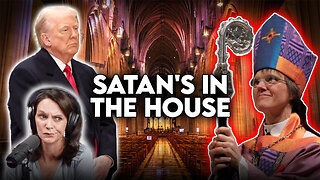 23:15
23:15
The Based Mother
13 hours ago $1.57 earnedHOLY BLASPHEMY! Trump vs. Episcopal Bishop Budde at the National Cathedral in DC
7.97K40 -
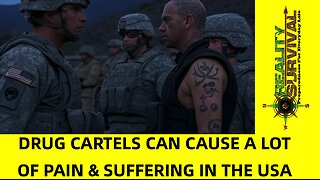 14:20
14:20
RealitySurvival
12 hours agoDrug Cartels Designated As Foreign Terrorist Organizations
6.59K5 -
![[Ep 591] Shock & Awe! Trump is Back! | Guest: Sam Anthony of [Your]News](https://1a-1791.com/video/fwe2/5c/s8/1/G/I/i/0/GIi0w.0kob-small-Ep-591-Shock-and-Awe-Trump-.jpg) 3:16:13
3:16:13
The Nunn Report - w/ Dan Nunn
1 day ago[Ep 591] Shock & Awe! Trump is Back! | Guest: Sam Anthony of [Your]News
29.4K8 -
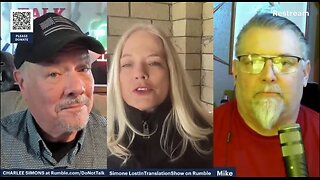 3:21:30
3:21:30
CharLee Simons Presents Do Not Talk
1 day agoDO NOT TALK with SIMONE ANDERSON, & MIKE COOK (World Collapse. Are You Ready?)
15.4K8 -
 1:38:35
1:38:35
FreshandFit
11 hours agoDecoding Lily Phillips' Lies Through An RP Lense!
78.1K31 -
 1:39:03
1:39:03
Benny Johnson
11 hours ago🚨 Trump Live Right Now From Oval Office in First Fox News Interview as President | ‘Watch This…’
191K209 -
 2:10:04
2:10:04
Barry Cunningham
12 hours agoLIVE WATCH PARTY: PRESIDENT TRUMP INTERVIEW WITH SEAN HANNITY!
73.2K28 -
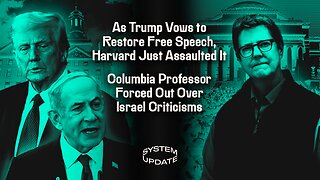 1:37:19
1:37:19
Glenn Greenwald
15 hours agoAs Trump Vows to Restore Free Speech, Harvard Just Assaulted It; Columbia Professor Forced Out Over Israel Criticisms | SYSTEM UPDATE #394
110K210 -
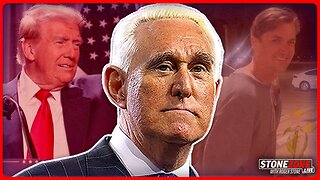 58:45
58:45
The StoneZONE with Roger Stone
12 hours agoTrump Pardons Ross Ulbricht | The StoneZONE w/ Roger Stone
82.5K17 -
 1:57:31
1:57:31
2 MIKES LIVE
21 hours ago2 MIKES LIVE #170 with special guest Rep. Buddy Carter (R-GA)
71.1K4